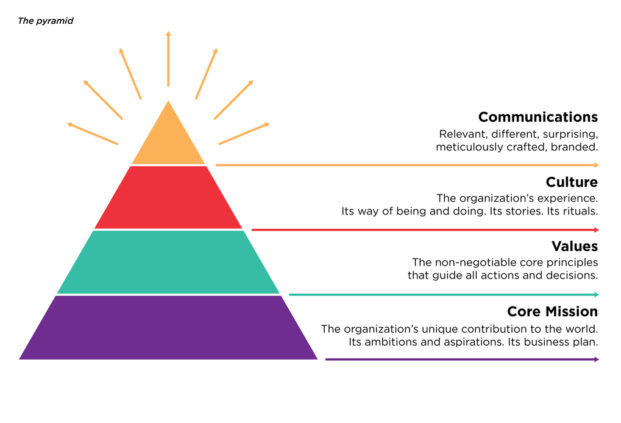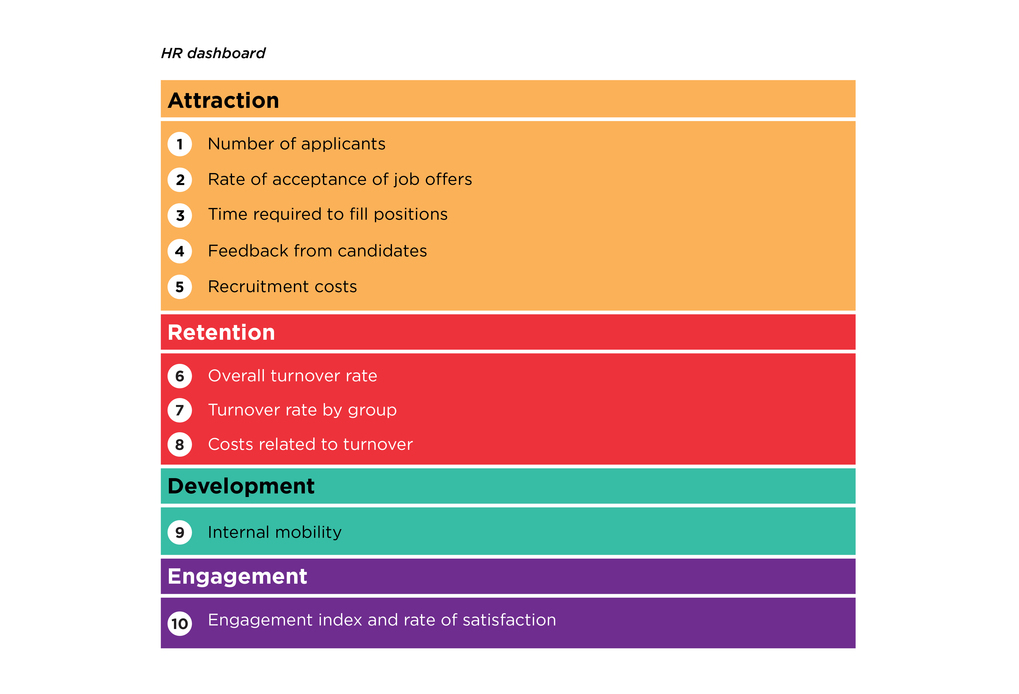
While the need to communicate with applicants may be pressing, communications are only the final, visible part of the employer brand. One cannot ignore the importance of good planning.
Cosmetic measures, superficial content, or cookie-cutter approaches inspired by media hype (whether bogus or having some basis in reality) are but illusory. All too often, they involve an expenditure of considerable effort and resources that fails to deliver real results.
Stating the obvious, actions that are well planned are always more effective. Though more demanding early on, a sound strategy and a good plan align and orient the entire organization in its actions and communications.
This, however, does not mean the process should be needlessly protracted or complicated, as that would incur the risk of missing out on opportunities. Rather, it simply means asking the right questions in the right sequence.
1. Get a thorough understanding of the organization’s dynamics. Assess the gap between the ambitions of the executives, the reality on the inside, and how external parties perceive the organization. Establish a solid HR dashboard grounded in reality. (See HR dashboard)
2. Establish an appropriate positioning. Clearly identify the organization’s difference and its relevance. Clearly define the value proposition presented to employees.
3. Develop programs and communications aligned with this positioning. Create communication pieces that are seductive, pertinent, differentiated and branded.
4. Roll out the programs and communications in a coherent manner. Ensure rigorous follow-up.

Survey of 250 executives and integration leaders who attended the Conference Board's annual conference on post-merger integration. BrandBourg's Customer Satisfaction Survey conducted in collaboration with Ad hoc Research.

It must be clearly understood that what we are calling the “employee brand” is nothing other than a manifestation of the overall organizational brand. And so, exhibiting a split personality is something to be avoided at all costs – especially in today’s transparent universe, where everything is easily known and widely communicated.
What does this mean? Simply put, that there are no shortcuts, unfortunately. Nowadays, your employees and your clients are at the helm. Their steadfast loyalty must be earned by your willingness to listen to their needs.
As Marty Neumeier writes in his essay The Brand Flip: “Power has shifted from companies to customers. People are not focused on products, but meaning. They hate being sold, but they love to buy. They buy in tribes to feel safe and successful.

Simon Sinek
No two organizations are the same. This is why there is no one-size-fits-all approach to making a brand and an organization desirable. One must return to their very essence. One needs to find the answer to the question “Why?”, as explained in a popular TED Talk delivered by Simon Sinek. Click here to see video
Emphasizing your core mission and your vision will add meaning to the business plan. Defining your values in depth will enable you to align the conduct and performance of employees and the decisions of senior executives. After all, a strong organizational culture finds its expression first and foremost in the actions of its leaders.
Those moments of truth that punctuate an organization’s history serve as anecdotes of the shared experiences that bind the group together, whether they have to do with setbacks, the manner in which obstacles are overcome, or the way success is celebrated. Rituals rich in meaning evolve out of these watershed moments. This is as true for startups as it is for well-established institutions.
In a world in search of meaning, people do not mobilize around a project that is not exciting. Consequently, it is necessary to thoroughly define and articulate a project before setting out to “tell it like it is” with a degree of conviction and eloquence. An organization’s unique flavour, its singular character, may be expressed in an impactful way only if it is well defined.
At any rate, know that social media and other communication platforms will relay—in an unfiltered way—what really goes on inside the organization. What you say about yourself matters not; what matters is what they say about you.
Walk the talk. Think and act before you communicate, because seducing only to later abandon is clearly not a solution for an employer brand. Your business plan must be relevant, different, and implemented, experienced and communicated powerfully and creatively. Authenticity is the key.
We asked five of our clients to give three reasons the employer brand is important to them.
In my view, the employer brand is much more than a marketing concept. It is an extension of a company’s mission and reveals something about its internal workings. It is important for three reasons.
1. It enables us to convey our culture to the outside world, but also to strengthen it from within.
2. It is a showcase for the human attributes and values that underpin our mission.
3. A well-conceived employer brand is able to reach talented people who will enjoy working with us and who will make an important contribution to value creation, and thereby, to our growth.
Behind every brand there are people!
I have taken the liberty of naming four.
1. A growth factor.
We cannot hope to grow our organization if we are unable to attract and retain the best talent. This is especially true in the field of innovation.
2. Keeping our promise.
This is without doubt the most fundamental reason. The individuals who join our team are choosing to engage in a project, namely that of delivering on our client promise, day after day. They need to thoroughly understand that promise and stand behind it completely.
3. A matter of compatibility.
We want our employees to feel at home and to know without any ambiguity whatsoever what they are getting involved in. It is the only way to build a long-term, productive relationship.
4. Team spirit.
An employer brand built on a solid culture is an essential factor in maintaining unity. This is all the more true for a business such as ours, which operates in a multicultural, multigeographical environment.
1. Attracting talent
There is a labour shortage in a number of industries, and finding talented candidates is thus a major challenge. Indeed, some have called this a “war for talent.”
The employer brand is essential and has a tremendous impact on recruiting the best candidates.
If a company’s image is strong, positive, and honest (that is to say, a reflection of its reality), the interesting candidates will be more inclined to join the organization (and to persuade others to do the same).
2. Retention
With a market that is constantly seeking talented candidates, recruitment is not sufficient; it becomes crucial to retain employees and encourage them to engage.
A strong employer brand conveys the culture of an organization effectively and is a source of pride and motivation for employees.
3. Visibility
A solid employer brand is seen as a sign of reliability by clients, partners and suppliers. The brand must be a reflection of the company’s culture and values. In a constantly shifting world, the employer brand is an essential showcase.
1. Taking concrete steps to define an employer brand is essential for an organization in rapid growth. The organizational culture in such a context is fragile and needs to be looked after with care. An employer brand helps disseminate and strengthen the organization’s values and culture.
2. A well-defined employer brand is a type of contract between a company and its employee, which both parties enter with full knowledge of the situation. This guarantees a better fit between the two from the very beginning. It also serves as a roadmap for the duration of the employment experience.
3. A culture that is strong and open to diversity facilitates the onboarding of new teammates. This is the best way to cultivate a sense of belonging for new recruits. They will feel welcome and will be more motivated to deliver daily on the company’s promise.
A company must not only promote its consumer brand, but also its employer brand, with consistency between the two. An employer brand focuses on current and prospective employees. In a climate of labour shortage, it is crucial for boosting employer visibility and attractiveness.
An effective employer brand lets current employees know exactly what kind of company they work for. This allows them to have a convincing “elevator speech” at the ready when asked who they work for. Employees want a brand they can believe in and therefore stand behind, which translates into better engagement with the company.
“The icing does not make the cake. Experience has taught me that people are not suckers. They can distinguish what is essential from what is incidental.”
- Pierre Leroux, Entrepreneur, Investor, Mentor, Founder of H&Co“To attract an optimal number of quality candidates, companies need to pinpoint the profile of the talent they seek. To do this, they need to clearly identify and express their values.”
- Sébastien Savard, President and Cofounder, Sourcinc“By defining their noble mission, organizations have a tremendous potential to impart far greater meaning to their activities, a key factor in inspiring attraction and mobilization. When they are able to anchor this meaning directly into the business strategy and observe the societal impact they generate, the spinoffs multiply, both for the company and the community.”
-Lucie Bourgeois, President and Founder, Umalia“Corporate CEOs and executives must be engaged and committed from the get-go in the process of defining the employer brand. They are the ones who set the course and daily embody the organization’s culture.”
- Renée-Claude Paris, President and Cofounder, Sismik“Having a good understanding of the mindset of one’s troops is critical in times of labour shortage. No one can afford to lose resources due to an erroneous reading of the situation. More than ever, companies must make the effort, in formal and informal ways, to stay attuned and to listen.”
- Michel Berne, Partner and Cofounder of Ad hoc rechercheView more relevant articles